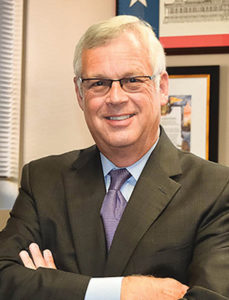
Dr. Bruce Leslie
Foundational Alignment
As an experienced leader in both these areas, I’ve witnessed firsthand how aligning strategic planning with robust fundraising practices can help educational institutions meet their missions. Student-serving institutions often resist the idea of operating as a business, but they need to function as one to sustain their missions.
I’ve seen the power that university foundations have in amplifying the resources available to their college, enabling it to fulfill its vision, mission, and values more effectively. Central to this power is the alignment between a university’s foundation and strategic plan, ensuring all fundraising initiatives support a university’s broader goals.
From my experience, this never happens by chance – it requires thoughtful, intentional, and collaborative design. One way to streamline collaboration toward this alignment is to ensure foundation directors report to the college president rather than being nested within a more complex administrative structure. This facilitates clear communication channels between the foundation board and the college board so that fundraising efforts strategically support institutional goals.
Effective Strategic Planning in Action in Education
A pivotal moment in my career occurred at Alamo Colleges, where we implemented a strategic plan that articulated key fundraising objectives and was dependent on them. This helped prevent our strategic plan from becoming just a document in a binder on a shelf—it was a dynamic roadmap guiding our daily operations and decision-making.
In this approach, key staff reported regularly to the college board with visual aids that showed key performance indicators and progress. Bringing data to the board fostered a culture of personal responsibility and transparency. We were able to both proactively address challenges and celebrate milestones. This also engaged stakeholders in the college’s progress, which was instrumental in motivating their support for fundraising initiatives.
We found tremendous value and benefit in reviewing whether our vision drove the purpose of the university and that this vision could be achieved by SMART goals: Specific, Measurable, Achievable, Relevant, and Time-bound. Bringing key performance indicators (such as graduation rates and performance outcomes) to track our progress also aided in sharing with both the foundation and college boards exactly where we were in our progress at any given point in time.
The Role of Fundraising in Strategic Planning in Education
I’ve witnessed time and time again that when fundraising becomes integrated with strategic planning, opportunities for institutional advancement and community engagement grow. For instance, at Alamo Colleges, our fundraising efforts not only bolstered scholarships and academic programs but also our infrastructure and community outreach and relations. This way, every dollar raised directly contributed to bettering student experiences and elevating the university’s reputation.
For example, a successful fundraising campaign expanded the planetarium at Alamo Colleges. It established the Challenger Learning Center, which brings adults and students in grades 4-12 into the roles of scientists, engineers, and astronauts. This rallied community support and wouldn’t have been successful without fundraising as a major part of our strategic goals.
Continuous Improvement & Adaptation
I think it is equally important to share that simply creating and following a strategic plan alone isn’t enough to carry a student-serving organization toward success. Strategic plans must also evolve alongside institutions’ needs and external challenges. Continual assessment, revision, and adaptation are needed to keep these roadmaps relevant and responsive to changing circumstances.
At Alamo Colleges, we consistently benchmarked our performance against peer organizations and national standards, providing valuable insight into areas where we excelled and needed improvement. This reassured leadership that we were aware of peer trends and that our accomplishments kept us ahead of the curve.
Empowering Educational Institutions for Generations to Come
While it takes collaboration and communication from many to keep fundraising and strategic planning aligned for educational organizations (not to mention fostering a culture that can carry this work forward), educational leaders recognize this work is transformative. We can help student-serving institutions become more resilient in today’s climate so they can empower students and their communities for generations to come. Beyond fundraising goals, this pursues securing the future of education itself.



